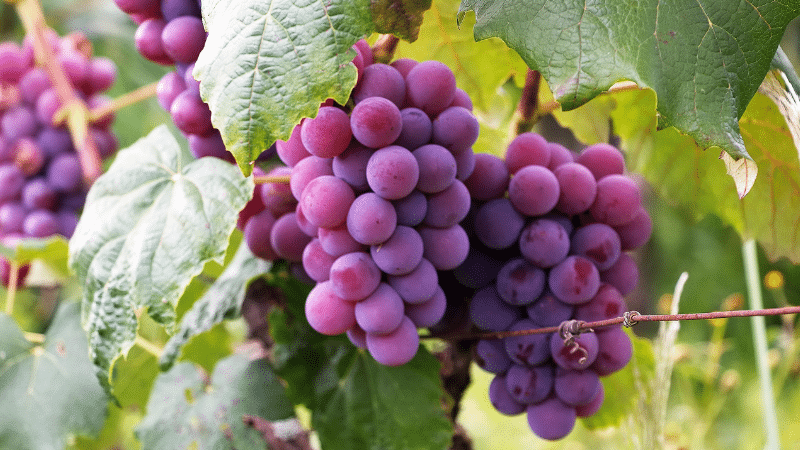Grapes, a staple in both edible gardens and commercial vineyards, benefit significantly from the practice of companion planting. This approach enhances grape health, improves soil quality, and can deter pests naturally. Let’s dive into the essentials of companion planting for grapes, highlighting the best and worst companions to ensure your vines thrive.
Key Takeaways
- Beneficial Companions: Certain plants can improve grape health and soil quality while offering natural pest control.
- Harmful Companions: Some plants compete with grapes for resources or attract unwanted pests.
- Considerations: The choice of companion plants should account for soil, climate, and grape variety.
- Vegetable Companions: Including specific vegetables can bolster grapevine health and productivity.
Good Companion Plants for Grapes
Good companions for grapes offer benefits like pest deterrence, soil improvement, or mutual growth support. Here’s a list of 10 plants known for their positive interactions with grapevines:
| Plant | Benefits |
|---|---|
| Lavender | Repels insects, attracts pollinators |
| Rosemary | Deters pests, improves soil fragrance |
| Chives | Enhances growth, repels pests |
| Basil | Repels insects, improves health |
| Marigold | Nematode control, attracts beneficial insects |
| Garlic | Pest control, improves soil quality |
| Clover | Fixes nitrogen, improves soil structure |
| Beans | Nitrogen fixation, supports soil health |
| Peas | Nitrogen fixation, companion support |
| Comfrey | Adds nutrients to soil, attracts beneficial insects |
Bad Companion Plants for Grapes
Certain plants can be detrimental to grapes, competing for resources or attracting harmful pests. Avoid planting these near your vines:
| Plant | Reason |
|---|---|
| Walnut | Allelopathic effects harm grapes |
| Cabbage | Competes for nutrients, attracts pests |
| Fennel | Inhibits growth, attracts wrong insects |
| Brussels Sprouts | Attracts pests, competes for space |
| Cauliflower | Competes for resources, attracts pests |
| Broccoli | Attracts pests, resource competition |
| Corn | Attracts pests, competes for nutrients |
| Potato | Disease risk, competes for nutrients |
| Eggplant | Attracts pests, resource competition |
| Peppers | Can attract harmful pests, competition |
Vegetable Companion Plants for Grapes
Incorporating certain vegetables can benefit grapevines by improving soil health and deterring pests:
| Vegetable | Benefits |
|---|---|
| Lettuce | Low competition, covers ground |
| Spinach | Provides ground cover, low competition |
| Radish | Breaks soil, attracts beneficial insects |
| Carrots | Improves soil structure, minimal competition |
| Beetroot | Enhances soil, low nutrient competition |
| Swiss Chard | Ground cover, attracts beneficial insects |
| Parsley | Attracts beneficial insects, low competition |
| Cilantro | Repels aphids, attracts beneficial insects |
| Borage | Attracts pollinators, improves growth |
| Kale | Provides ground cover, attracts beneficial bugs |
Conclusion
Companion planting offers a holistic approach to maximizing the health and yield of your grapevines. By choosing the right companions, you can create a vibrant, productive, and pest-resistant vineyard. Remember, the specific benefits of companion plants can vary based on your climate, soil, and grape variety, so it’s essential to consider these factors when planning your vineyard.
Zaki Infitar is the driving force and creative mind behind GreenBuilt.co. As a self-taught gardener with an unwavering passion for all things green, Zaki’s journey into the world of gardening is a testament to his dedication and love for nature.

